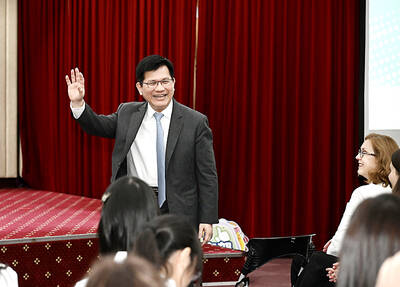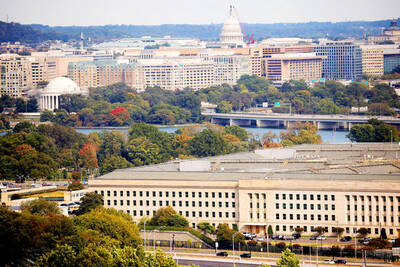Chinese Nationalist Party (KMT) caucus secretary-general Chang Sho-wen (張碩文) said yesterday that Chou Chan-chun (周占春), a Taipei District Court judge who upheld the release of former president Chen Shui-bian (陳水扁) without bail on Wednesday last week, should be replaced.
At a press conference, Chang said Chou should refrain from presiding over cases involving the former president because some of Chou’s remarks in response to President Ma Ying-jeou’s (馬英九) special allowance case were inappropriate.
The Taiwan High Court on April 24 found Ma not guilty of misusing his special allowance during his eight-year tenure as Taipei mayor.
Chang was responding to a story in yesterday’s Chinese-language United Daily News that quoted KMT Legislator Chiu Yi (邱毅) as saying that Chou previously told his colleagues that he would have sentenced Ma to 10 years in prison in the special affairs fund case if he had presided over Ma’s trial.
The story cited Chou as saying that he had expressed opinions regarding Ma’s case, but that he had never made the remarks attributed to him by Chiu Yi.
The story also quoted Chiu as saying that Chou urged his colleagues to vote for Chen during the presidential elections in 2000 and 2004. Chiu did not present any evidence to back his claims.
Chou has drawn harsh criticism from the KMT after a district court panel that included Chou ruled on Dec. 13 and again on Dec. 18 that Chen would not be detained.
Chen and 13 other people were indicted on Dec. 12 on charges of embezzlement, bribe taking and money laundering.
KMT lawmakers accused Chou of bias.
“[Chou] helping Chen with the elections shows that Chou was fond of Chen and might be a fan,” KMT caucus deputy secretary-general Lo Shu-lei (羅淑蕾) said.
KMT Legislator Lee Ching-hua (李慶華) called Chou’s performance on Dec. 13 and Dec. 18 “ridiculous,” saying that the replacement of Chou would be “the best Christmas gift for everyone.”
Meanwhile, the Supreme Prosecutor’s Office’s Special Investigation Panel (SIP) yesterday said it would appeal the district court’s decision to release Chen for a second time with the Taiwan High Court today with a request that the high court itself decide whether or not to detain Chen.
State Public Prosecutor-General Chen Tsung-ming (陳聰明) told reporters yesterday that the SIP hoped the Taiwan High Court would make the ruling itself and not return the case to the district court.
The SIP said if the high court returned the case to Chou, it stood little chance of making him change his mind.
In related news, the Ministry of Foreign Affairs (MOFA) said yesterday it would fully cooperate with the judiciary after former deputy minister Michael Kao (高英茂) was slapped with a travel ban on Monday over his suspected role in a US$500,000 embezzlement case involving Chen and former National Security Council head Chiou-I-jen (邱義仁).
“We do not comment on pending legal cases. We respect the law and will fully cooperate with investigators,” MOFA Spokesman Henry Chen (陳銘政) said.
Kao, who recently stepped down as representative to the EU for health reasons following bypass surgery, was questioned by the Special Investigation Panel last Thursday about the An-ya Project, in which Chiou is suspected of pocketing US$500,000.
The project was signed off under former foreign minister Eugene Chien (簡又新) and Mark Chen’s (陳唐山) watch during the Democratic Progressive Party administration.

FIREPOWER: On top of the torpedoes, the military would procure Kestrel II anti-tank weapons systems to replace aging license-produced M72 LAW launchers Taiwan is to receive US-made Mark 48 torpedoes and training simulators over the next three years, following delays that hampered the navy’s operational readiness, the Ministry of National Defense’s latest budget proposal showed. The navy next year would acquire four training simulator systems for the torpedoes and take receipt of 14 torpedoes in 2027 and 10 torpedoes in 2028, the ministry said in its budget for the next fiscal year. The torpedoes would almost certainly be utilized in the navy’s two upgraded Chien Lung-class submarines and the indigenously developed Hai Kun, should the attack sub successfully reach operational status. US President Donald Trump

Taiwan Semiconductor Manufacturing Co (TSMC, 台積電) is expected to start construction of its 1.4-nanometer chip manufacturing facilities at the Central Taiwan Science Park (CTSP, 中部科學園區) as early as October, the Chinese-language Liberty Times (the Taipei Times’ sister newspaper) reported yesterday, citing the park administration. TSMC acquired land for the second phase of the park’s expansion in Taichung in June. Large cement, construction and facility engineering companies in central Taiwan have reportedly been receiving bids for TSMC-related projects, the report said. Supply-chain firms estimated that the business opportunities for engineering, equipment and materials supply, and back-end packaging and testing could reach as high as

ALL QUIET: The Philippine foreign secretary told senators she would not respond to questions about whether Lin Chia-lung was in the country The Ministry of Foreign Affairs on Wednesday confirmed that a business delegation is visiting the Philippines, but declined to say whether Minister of Foreign Affairs Lin Chia-lung (林佳龍) is part of the group, as Philippine lawmakers raised questions over Lin’s reported visit. The group is being led by Deputy Minister of Agriculture Huang Chao-chin (黃昭欽), Chinese International Economic Cooperation Association (CIECA) chairman Joseph Lyu (呂桔誠) and US-Taiwan Business Council (USTBC) vice president Lotta Danielsson, the ministry said in a statement. However, sources speaking on condition of anonymity said that Lin is leading the delegation of 70 people. Filinvest New Clark City Innovation Park

DEFENSIVE EDGE: The liaison officer would work with Taiwan on drones and military applications for other civilian-developed technologies, a source said A Pentagon unit tasked with facilitating the US military’s adoption of new technology is soon to deploy officials to dozens of friendly nations, including Taiwan, the Financial Times reported yesterday. The US Department of Defense’s Defense Innovation Unit (DIU) is to send a representative to collaborate with Taiwan on drones and military applications from the semiconductor industry by the end of the year, the British daily reported, citing three sources familiar with the matter. “Drones will certainly be a focus, but they will also be looking at connecting to the broader civilian and dual-use ecosystem, including the tech sector,” one source was